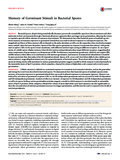Memory of Germinant Stimuli in Bacterial Spores
Author
Wang, Shiwei; Faeder, James R.; Setlow, Peter; Li, Yong-Qing
Abstract
Bacterial spores, despite being metabolically dormant, possess the remarkable capacity to detect nutrients and other molecules in their environment through a biochemical sensory apparatus that can trigger spore germination, allowing the return to vegetative growth within minutes of exposure of germinants. We demonstrate here that bacterial spores of multiple species retain memory of transient exposures to germinant stimuli that can result in altered responses to subsequent exposure. The magnitude and decay of these memory effects depend on the pulse duration as well as on the separation time, incubation temperature, and pH values between the pulses. Spores of Bacillus species germinate in response to nutrients that interact with germinant receptors (GRs) in the spore’s inner membrane, with different nutrient types acting on different receptors. In our experiments, B. subtilis spores display memory when the first and second germinant pulses target different receptors, suggesting that some components of spore memory are downstream of GRs. Furthermore, nonnutrient germinants, which do not require GRs, exhibit memory either alone or in combination with nutrient germinants, and memory of nonnutrient stimulation is found to be more persistent than that induced by GR-dependent stimuli. Spores of B. cereus and Clostridium difficile also exhibit germination memory, suggesting that memory may be a general property of bacterial spores. These observations along with experiments involving strains with mutations in various germination proteins suggest a model in which memory is stored primarily in the metastable states of SpoVA proteins, which comprise a channel for release of dipicolinic acid, a major early event in spore germination.
Date
2015-11
Citation:
APA:
Wang, Shiwei, & Faeder, James R., & Setlow, Peter, & Li, Yong-Qing. (November 2015).
Memory of Germinant Stimuli in Bacterial Spores.
mBio,
6(6),
1-
10. Retrieved from
http://hdl.handle.net/10342/5773
MLA:
Wang, Shiwei, and Faeder, James R., and Setlow, Peter, and Li, Yong-Qing.
"Memory of Germinant Stimuli in Bacterial Spores". mBio.
6:6. (1-10),
November 2015.
April 19, 2024.
http://hdl.handle.net/10342/5773.
Chicago:
Wang, Shiwei and Faeder, James R. and Setlow, Peter and Li, Yong-Qing,
"Memory of Germinant Stimuli in Bacterial Spores," mBio 6, no.
6 (November 2015),
http://hdl.handle.net/10342/5773 (accessed
April 19, 2024).
AMA:
Wang, Shiwei, Faeder, James R., Setlow, Peter, Li, Yong-Qing.
Memory of Germinant Stimuli in Bacterial Spores. mBio.
November 2015;
6(6):
1-10.
http://hdl.handle.net/10342/5773. Accessed
April 19, 2024.
Collections

